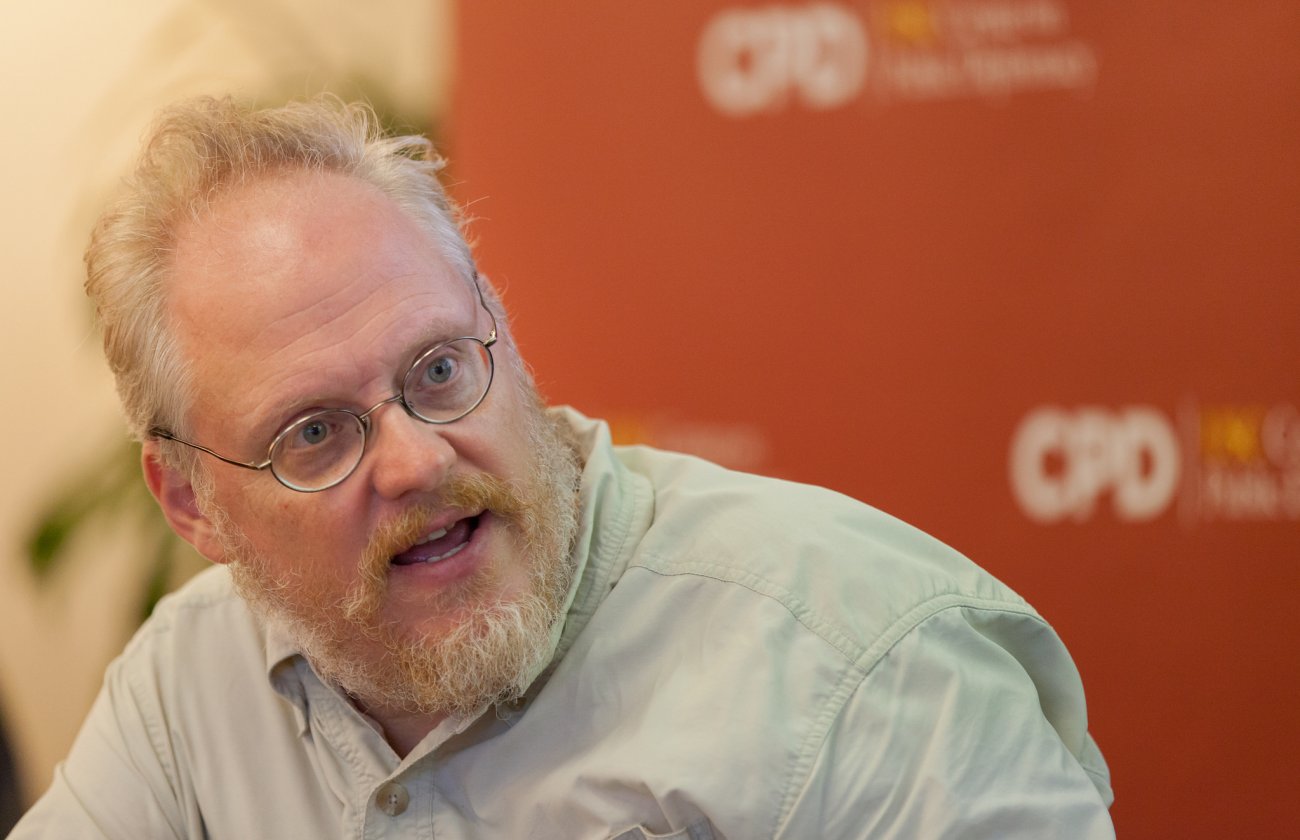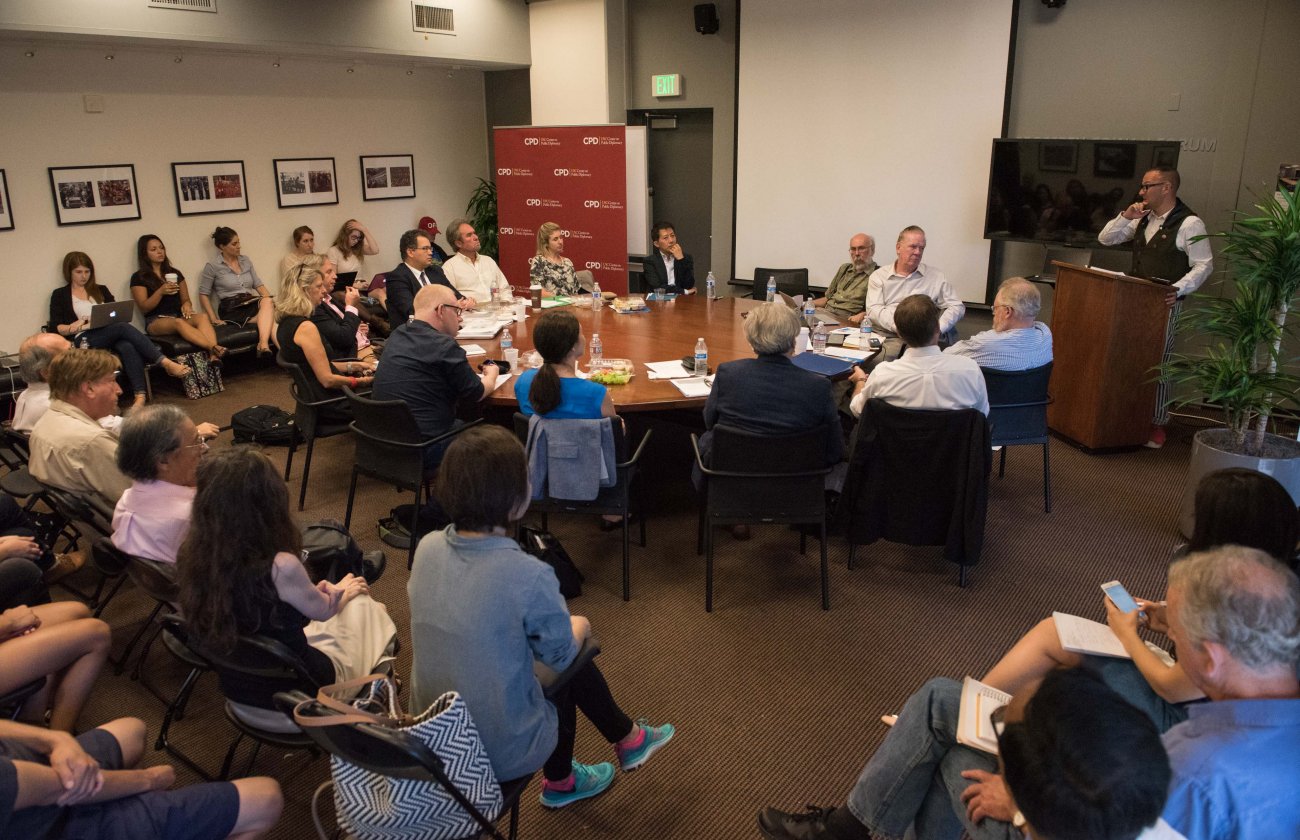Inside the classrooms at USC Annenberg, students are the ones typically tasked with answering the hard hitting questions. "Five Minutes with..." turns the table on faculty members to ask them the questions.
In a recent article for History Extra, professor Nicholas Cull wrote about the beloved “Star Wars” movie franchise and what effects it had on American and international audiences when it first premiered in 1977.
In the article, Cull writes about the franchise’s unique place in history. A historian by training, Cull is the director of the Master of Public Diplomacy program at USC Annenberg. The movies borrowed heavily from genres like the classic western, Cull said, and reflected a sense of escapism from historical and political reality for the audiences, among other things.
USC Annenberg sat down with Cull to talk about why the franchise is so popular, what parallels it drew at the time for movie goers, and whether the new “Star Wars: The Force Awakens” will take us to a galaxy far, far away again.
What made you decide to write this article and what are some of the parallels you draw between real society and the movies?
As a historian I got interested both in the creative process that brought George Lucas to tell that story at that time, and ways in which people reacted and what people found in “Star Wars” when they first watched it. The conclusion that I came to after examining the various scripts for “Star Wars” and looking at the production process was that “Star Wars” hinges on something very similar to the phrase that’s used in the opening of the movie: “long ago in a galaxy far, far away.” The essence of “Star Wars” is that it’s escapism but it’s not escapism into an alternative present or an alternative future, it’s looking to the past. In “Star Wars” there is a science fiction type of escapism but there’s also a sense of the past. It’s fundamentally a nostalgic experience. It was nostalgic for George Lucas making the film, as he wanted to recapture the cinema he’d enjoyed growing up in the 1950s and it was nostalgic for the audience who really missed those kinds of films. In “Star Wars” you can see how he uses a science fiction setting to remember and recall a number of genres that had either fallen out of fashion or had become really politically incorrect in the 1970s. These were genres like science fiction itself, the war movie, the western, the religious epic — all of these elements could be pulled into “Star Wars” and made fresh. And because it was happening in another galaxy you didn’t have to worry about the historical reality of those genres, the fact that World War II had ended with the atomic bomb being dropped on Japan or the fact that the American West was a kind of genocide.
I think what “Star Wars” offered audiences in 1977 was a way to have your cultural cake and eat it. You could have all the fun of a war film or a western or a pirate movie, or a mythic adventure without having to worry about the political realities. A lot of the things that were negative in movies like ethnic humor, making fun of foreigners or being obsessed about different kinds of cultures, that you would see in movies in the 1950s, that stuff can be in “Star Wars,” but nobody is offended because the stereotypes are about sand people or droids or wookiees and in the first instance, nobody could be offended about that. Though I did find there were angry letters to the newspapers when people began to realize that maybe Chewbacca was the black character and he didn’t get a medal at the end of the first film. So some people started to try to find parallels to American ethnicity within the “Star Wars” ethnicity.
Why is the “Star Wars” movie so important? For example, the movies echo the ethnic and racial differences we still see today in American society, if not the world.
To begin with, the film … operated like kind of an archive of popular cinema from the 1950s but because it was so successful it became possible for George Lucas to expand the story and instead of it being about nothing but him remembering going to the movies, it could become about everything.
He’s able to make it about the relationship between parents and children, finding your way in the world and a lot more meaning can come out of the saga because of that. The success means, that at some level, “Star Wars” becomes about “Star Wars” and you can see this with the prequel trilogy that we got a few years ago now. My final conclusion is that whereas, when we first saw the film in 1977 we were remembering movies when we watched “Star Wars.” Now, when we watch Star Wars we are remembering “Star Wars.” “Star Wars” has become its own source and its own point of cultural engagement. And as late as the Phantom Menace, there are still references to 1950s cinema going on within the body of the film. There’s a long sequence in the Phantom Menace, which is re-creating the chariot race from “Ben-Hur.”
Do you think the new “Star Wars: The Force Awakens” movie will allow us viewers escape to a galaxy, far, far away?
Absolutely, but with “Star Wars”, there’s always two trains running. It’ll allow the movie to escape and it’ll also allow their money to escape. It’s an amazing piece of business to have kept a franchise going this effectively for nearly 40 years. It’s an extraordinary story. But especially in the way he was able to bring it back in the 1990s by creating the new version, much as the fans were uncomfortable with that, the new edition of “Star Wars” building up to the prequels … it’s stayed fresh and it’s become a reference point. You have both politicians referring to “Star Wars” and also ordinary people putting in “Star Wars” references when they’re speaking.
What other research have you done that’s similar to looking at a beloved franchise?
I’ve written a number of pieces using film as a historical source. I’m president of the International Association of Media and History, which is way of bringing historians together to do that. I did a whole book with my colleague James Chapman looking at how different science fiction movies can be used to explain the past. It had a chapter on “Robocop” for example, and another one on "Forbidden Planet." We’ve also done a similar book on British Empire movies like “Lawrence of Arabia” and what the production of particular imperial movies can tell you about Imperialism and race in the British Empire. This is something I find fascinating and I always think, as I said at the beginning, the success of the film must tell you something about the time in which it’s made. So often historians forget to look at that. What does “Titanic” tell us about 1997?
What is your favorite part about teaching and working at USC Annenberg?
The best thing about teaching at USC Annenberg is the quality of the students. I think that makes me happy to go to class every day, just to be able to work with such amazing young people who want to make the world a better place. I always say that, consistently that’s the best thing about being here.
This interview has been edited for length and clarity.









